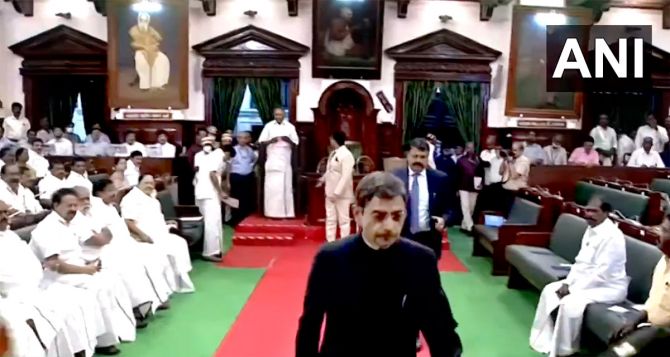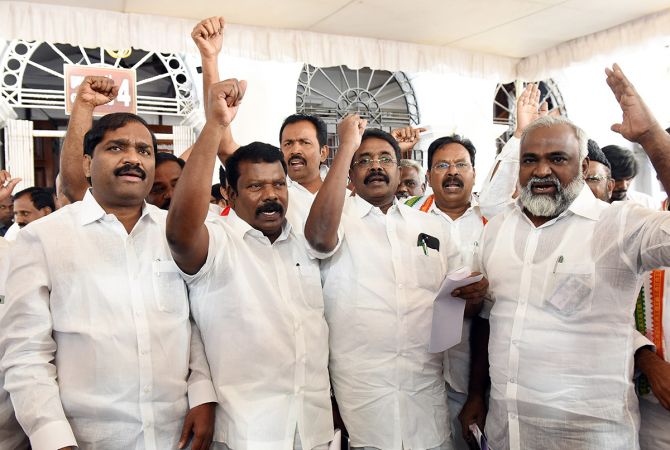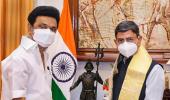According to state government sources, not only did the governor insert some corrections, but he also initialled the final draft after those corrections had been made, reveals N Sathiya Moorthy.

The epoch-making Tamil Nadu assembly recorded yet another low when Governor R N Ravi departed from the prepared speech for the annual address to the state assembly, as approved by the state government -- including the 'minor corrections' reportedly suggested by him to the draft -- and DMK Chief Minister M K Stalin moving a spur-of-the-moment resolution that struck off the spoken word in favour of the written version, circulated to the members, leading to the former storming out of the august House, unceremoniously without being accompanied by Speaker M Appavoo and retinue, as should have been the case.

Live telecast of the incident showed the governor's personal staff hurrying to catch up with the boss as Ravi took strident steps to the exit door without waiting even for the customary National Anthem, which his detractors said, too, was against protocol.
The other side, particularly belonging to the state BJP and also a section of the Opposition AIADMK, including House leader and former chief minister Edappadi K Palaniswami pointed to the chief minister getting on his feet when the governor was still present and moving what amounted to a 'censure motion'.
They argued that Stalin's action not only defied protocol, but also was an outright insult to the high office of the governor.

Trouble started even as the governor entered the House ceremonially with the speaker in the lead, when allies of the ruling DMK, including the Congress, resorted to slogan-shouting, against the governor's controversial suggestion for renaming Tamil Nadu as 'Tamizhagam'.
DMK members were obviously instructed not to join the ruckus, and they remained calm, after their parliamentary group leader T R Baalu and Stalin had responded to the governor, through public statements, on the 'name change' issue.
It was not the first time that the political Opposition greeted the governor of the day with slogan-shouting of the kind, but much of it used to be confined to their criticism of the government and not the gubernatorial tenant of the Chennai Raj Bhavan.
But it definitely was the first time when the governor departed from the prepared speech, approved and forwarded by the state cabinet, as has been the custom and tradition, not only in Tamil Nadu but also across the country, starting with the President and Parliament.
It is agreed that the government had sent the draft speech to the governor for prior approval and had also carried out the 'minor corrections' suggested by him.
Included in the list were term changes from 'prime minister' to 'prime minister of India', and 'Union government' to 'Government of India'.
Clearly, the former was aimed at bolstering Ravi's argument (and possible belief) on the Tamil Nadu-Tamizhagam row, triggered by him.
The fact however remains that the term 'premier' or 'prime minister' had ceased to exist with the exit of the British colonial rulers, who had given that title to elected heads of presidency governments.
Even before the Constitution came into being, elected heads of provincial governments came to be called 'chief ministers', and 'prime minister' referred only to one person, that is, the prime minister of India.

Likewise, though the DMK had made an issue of referring to the Centre or the Government of India only as 'Union of India', it is also the only Constitutional term for what is commonly known as the 'Centre' or the Government of India'.
Hence, for the governor to have made that change, and without that change making it to the news, would have made no difference though in terms of deference to the Constitution, there might still be a debatable issue.
According to media reports, the governor had departed from the prepared speech, in different places and contexts.
Thus, he dropped positive references not only to the Dravidian ideological fountainhead, 'Periyar' E V Ramaswami Naicker, but also to the 'father of the Constitution', Dr B R Ambedkar, and three former chief ministers, namely, K Kamaraj, C N Annadurai and M Karunanidhi.
Possibly, the government might not have objected to his including the names of Swami Vivekananda and Tamil freedom-fighter and poet Subramania Bharati, the complaint is that the governor had inserted the names into his speech, rather, 'surreptitiously'.
Among other references that the governor had reportedly dropped included, of all things, Tamil Nadu's ranking as per the 'social progress index' released by the prime minister's economic advisory council, 'based on the study of development status of states'.
Possibly, the governor was ill-advised in the matter, and someone confused the Centre's ranking with that of what the news magazine India Today, conferred after a recent study-cum-survey.
The ruling party is also peeved that the governor had dropped references to what Stalin has coined as the 'Dravidian model' of governance.
They say Ravi could have sought a meeting with the chief minister or his political representative to sort out his grievances, but had no discretion to drop it.

The question if the governor has the discretion to omit or add anything to the cabinet-approved address can be answered when considered in the context of the relevant Constitutional provision.
According to state government sources, not only did the governor insert some corrections, but he had also initialled the final draft after those corrections had been made.
Government circles feel more hurt over this than what they say are 'other forms of pro-BJP politics' of Governor Ravi, given that it is the governing party at the Centre.
The question is if the discretion granted to a state governor under Article 163 (2) and (3) is applicable to the address to the legislature.
Article 163 (1) reads thus: 'There shall be a Council of Ministers with the Chief Minister at the head to aid and advise the Governor in the exercise of his functions, except in so far as he is by or under this Constitution required to exercise his functions or any of them in his discretion."
This is followed by proviso (2), which says, 'If any question arises whether any matter is or is not a matter as respects which the Governor is by or under this Constitution required to act in his discretion, the decision of the Governor in his discretion shall be final, and the validity of anything done by the Governor shall not be called in question on the ground that he ought or ought not to have acted in his discretion.'
Proviso 163 (3) only reiterates the governor's discretion in matters of judicial scrutiny: 'The question whether any, and if so what, advice was tendered by Ministers to the Governor shall not be inquired into in any court.'
State government sources indicate that the governor's 'discretionary powers' does not cover his address to the legislature, which in form and content, is only a 'policy statement' of the elected government.
As they point out, the governor's maiden address to a new assembly after fresh elections to the state assembly could only constitute the outlook of the elected government, and the governor could have any discretion in the matter.
They may have a point. As happens in most states where an incumbent government is voted out, the governor's address declared without saying it that 'my government would undo what all my government did or promised last year'.
Or, that is how a Bangalore-based daily explained it in a cartoon when then Karnataka governor Govind Narain was delivering the policy statement of the Ramakrishna Hegde-led government in 1982, after it had ousted the incumbent Congress dispensation of chief minister R Gundu Rao, in the year's assembly elections.
For all this, however, this is not the first time that the Tamil Nadu government has created history of other dubious kinds.
As Madras state, the nation's maiden post-Independence elections of 1952 witnessed a non-member in Rajaji becoming chief minister, as a 'nominated member' of then governor Sri Prakasa.
Rajaji repeated the feat one more time when he became the first of two chief ministers in the country to win a majority with speaker A Sivashanmugam Pillai's 'casting vote'.
The other was Kerala's C H Mohammed Koya, two-plus decades later.
More was to follow in the decades, hence.
Under the DMK's Karunanidhi, the House witnessed two speakers presiding over the day's session at the same time, with then deputy speaker P Sreenivasan (who had defeated Kamaraj in his Virudhunagar constituency in 1967) sitting on the lap of the rebel incumbent K Mathiazhagan.
Worse things happened after MGR's death and the ruling AIADMK was split between factions led by his widow and then chief minister Janaki Ramachandran and yesteryear co-star J Jayalalithaa.
On the day the House met for a confidence vote in the Janaki government, all hell broke loose, and identifiable goons and policemen in civvies entered the well of the House and bashed up anti-government MLAs and journalists alike.
It led to the Centre imposing President's rule after dissolving the assembly.
In the elections that followed months later, Karunanidhi and the DMK returned to power after what he himself described as 'vanavas' for 13 long years.
However, his short-lived innings of two years was marred by Jayalalithaa as Opposition leader barging at him when he rose to present the budget, dislodging his coolers that hid an eye blinded in a road accident, and DMK legislator S Duraimurugan, seeking to stop her on her track, and her sari getting caught in the melee.
The older generation still visualises a dishevelled Jaya seeking justice from the people of Tamil Nadu, outside the House, a scene reproduced recently in the Kangana Ranaut's biopic of the leader.
Yet, Karunanidhi's handling of the Centre-appointed governors was formal to courteous to friendliness, as individual cases me.
Though the DMK believed that a 'governor's post is like the beard of a billy goat' ('attukku thadiyum, nattukku governor-rum thevai illai'), he, his predecessor Annadurai and AIADMK successor MGR all respected the office for what it was, and the person for who he turned out to be.
A downtrend was witnessed in governor-government relations during Jayalalithaa's first term as chief minister (1991-1996), when she formally protested to then prime minister P V Narasimha Rao at Chennai airport.
On another occasion, she placed on the assembly record that then governor Marri Chenna Reddy had 'misbehaved' with her when they met one-on-one in Raj Bhavan.
Neither did Jaya offer any explanation nor did Raj Bhavan issue any rebuttal.
What possibly was the lowest moment in this relation was reached when ruling AIADMK cadres gheraoed governor Reddy on a narrow stretch of national highway in the northern district town of Tindivanam, for over six hours.
Neither the chief minister, nor the prime minister intervened., when partymen held the governor prisoner, if not hostage.
They dispersed only after word spread that Raj Bhavan was formally filing a report to the President and Union home ministry, which could view things more seriously than was originally thought to be!
N Sathiya Moorthy, veteran journalist and author, is a Chennai-based policy analyst and political commentator
Feature Presentation: Ashish Narsale/Rediff.com











